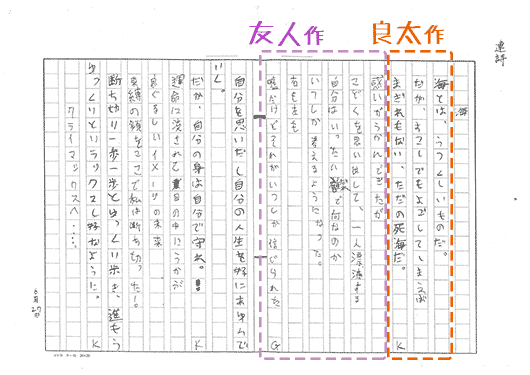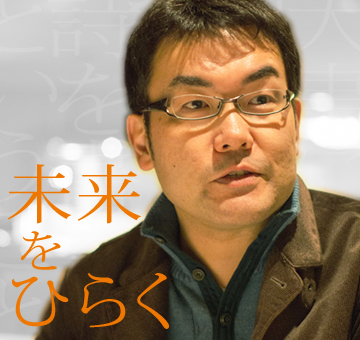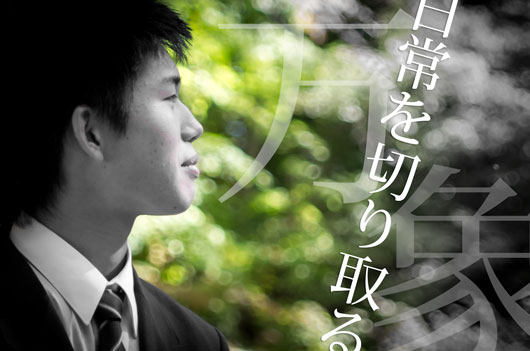The Power of Words
vol.2
Communicating through Poetry
Ryota (3rd-year junior high school student, 15 years old, Fukushima Prefecture)
2013.03
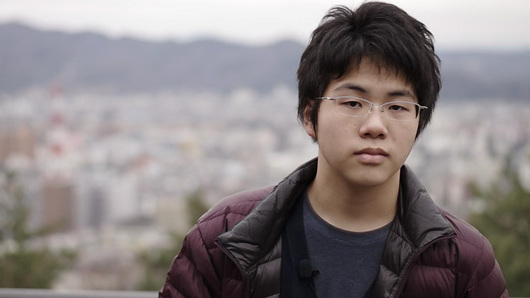
Ryota also participated in the workshop held six months later in late July. The theme this time was "Being Myself."
What did Ryota think about, and what did he attempt to express through his work?
*A two-day overnight workshop hosted in the summer and winter by the Fukushima Prefectural Government since 2010 for elementary and junior high schools students. The summer session in 2011 as it was soon after the triple disasters, but the following winter session was held thanks to the strong desire of those involved to provide a forum for children to express themselves precisely because of the circumstances. A theme is set for each session, and participants are exposed to drum and dance performances to help inspire them in composing poems. The participants then recite their poems in front of a large audience.
Dear Fukushima,
I'm worried about you.
I really want to know how you feel right now.
What do you think about the people who are living here right now?
Do you know what you should be doing do right now?
What do you want to do right now?
What do you want to communicate right now?
What do you want to ask right now?
Do you understand sadness?
Do you understand happiness?
What are you thinking right now?
Do you like people?
Have you ever fallen in love?
Have you ever been heartbroken?
Have you ever cried?
I understand sadness and happiness.
I like people.
I have fallen in love.
I have yet to be heartbroken. That is, because I've never professed my love to anyone.
I have cried.
I want to hear your answers right now.
I wrote this poem at the poetry workshop held in January 2012. The Great East Japan Earthquake had happened a year earlier.
The reason I entitled it "Dear Fukushima" was because I wanted to ask these questions of Fukushima Prefecture itself. As Fukushima Prefectural residents, we're worried about it. But we can't directly speak to it. After the earthquake, the nuclear power plant crisis broke out. I wanted to find out what Fukushima Prefecture itself, the buildings and the land, trees, and everything in Fukushima felt.
There are a number of nuclear power plants in the Hamadori region of Fukushima. When they were built, people were probably really happy about it, because it would make life easier economically. But "easy" actually came with a lot of risks. I don't think anyone at the time imagined that something like this would happen from an earthquake. Radioactive materials have scattered all over and an easy life is no longer possible.
I hope it won't happen, but people might disappear from Fukushima. If that happens, all that will remain are the buildings and signs that people once lived here. I get the strong sense that Fukushima is rapidly wasting away, that despite reconstruction efforts, Fukushima is crumbling.
Inanimate objects don't speak. There's nothing we can do but use our imagination. If we could hear the things objects had to say, I think our thinking would change somewhat. If the land could tell us what it wants us to do, I'd want to do it. It's the fault of human beings that the land has suffered so much damage. People say this was a natural disaster, but I think there's a strong element of manmade error in it. Even if the earthquake had happened, if there had been no nuclear reactors, the land would have been spared radiation contamination.
If humans are at fault for what happened, that means I'm at fault as a human being, and most all people, too. The land itself never truly belonged to anyone. Land belonged to itself. I think the land had trusted that people would take care of it no matter what. So as long as we're living in Japan, we have to take responsibility for the land. It isn't right to do as we please with it, abandoning it after playing with it or making a mess of it. We have to clean up after messing things up. Unless that becomes the norm, we can talk about reconstruction, but it's questionable whether we'll really be able to rebuild.
Feelings for Buildings and Land
Listening to everyone else's poems on the theme, "Communicating Our Feelings for Fukushima," I could tell everyone is worried about Fukushima and wants to do something about it. Their poems offer encouragement and support to people in Fukushima. But I don't think it's just the people who are suffering. The people are living on land. We have to think not only about people, but also about the buildings and the land.
That's why I want the grown-ups who are responsible for the reconstruction efforts in Fukushima to think about the land and buildings there. And I really want them to ask us--the people who will be living the future--for our input. It's not like my opinion will change the current situation, but I want the people who are hurting in Fukushima to be connected.
By writing a poem on Fukushima, I was able to confront it head-on. Of course, even if I hadn't participated in the workshop, if I'd kept running away from reality, I think my mother and other adults I know would have told me to look the issue straight in the face. But writing poetry helped me sort through my desire to connect with people in Fukushima.
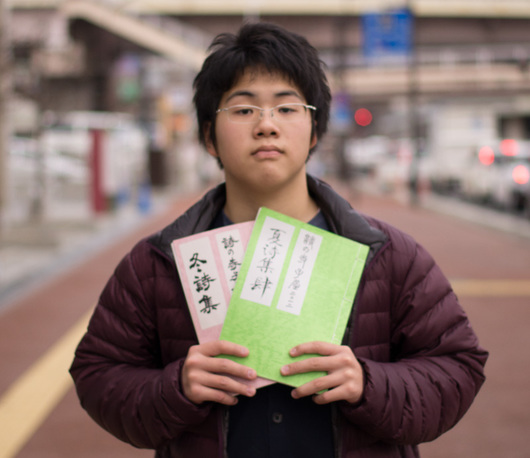 I was always interested in poetry.
I was always interested in poetry.
Starting when I was in third or fourth grade, a friend and I began writing poems, calling ourselves the "Young Poets Brigade." We went to different elementary schools, but our parents worked for the same non-profit organization involved in community building, so we saw each other about once a week.
When we got together, we'd decide on a topic and compose individual poems or collaborative poems, where I'd write for a while, and then my friend would, and then I would, and we'd keep alternating like that. My friend and I wrote different styles of poetry, so this was a lot of fun.
Significance of Writing Poetry
To me, writing poetry is about communicating my feelings, my thoughts, my needs, and my hopes. Also, putting the thoughts in my mind into words helps organize them, so there's that. When I have trouble saying something out loud, it helps to write it out, because it gives me more time to work out how to say it in a way people will understand. It helps me express my feelings. For me, poems, which gives you freedom in terms of length and content, is a lot easier to write than long prose like essays.
The poetry workshop lets me say what's inside my heart. Because the participants know each other through our poems, I feel like I can say what I want. That's why the participants get along really well. I get along with my classmates at school, too, but something's different. Of course, my friends from both are great in their own way.
When I write poems I usually decide on a title first. From there, I let my imagination take over to figure out how to get across what I want to say.
At the July 2012 workshop, I wrote a poem titled "Passage of Time" based on the theme, "Being Myself." We watched a dance performance by Karasawa Masae during the workshop. She performed four different types of dances* in different places. We went from being indoors to a wide, open garden. At the end, she ran around with a white cloth fluttering along with her. To me, it looked like she was running through time and space. That's how I came up with the title, "Passage of Time." I decided to use that to express myself.
Time passes. We can't turn back time, even the time that we're experiencing right now. In terms of the nuclear power plant, we can't go back to a time before the disaster. It's not that we suddenly found ourselves unable to go back in time, but it began when we built the nuclear power plants. We always have to think about the risks when we start something new.
Dreams for the Future
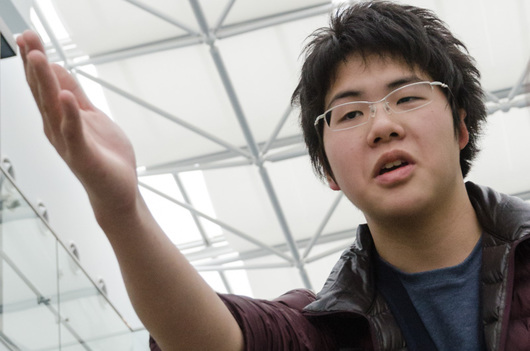
I'd like to work in architecture in the future. Maybe it's the coziness of wood, but when I'm in a wood building, I feel at ease. No matter what, I want to work with wood. I love wood. That might be why I'm so concerned about the buildin
gs, trees, and land in Fukushima.
*2 Karasawa Masae is a modern dancer who works as a part-time lecturer at Tokyo Women's College of Physical Education. At the poetry workshop, she performed four different types of dances in four different locations of the workshop site: a narrow aisle between bookshelves in the library, a library courtyard decorated with bamboo and rock, a stream, and an open stretch of grass.
Passage of Time
Time, what is time?
Nobody knows.
Time, at times, is cruel.
Time, at times, is fleeting.
Time, at times, metamorphoses into many things.
Time came to being when the universe came to being--no, nobody knows when time came into being.
Time just passes, on and on.
Everyone at some point has wanted to stop the passage of time.
I've thought that, too.
But time, no matter what happens, regardless of whether the people disappear from before you
Regardless of the situation one is placed in, cannot be stopped.
No matter what happens.
Even when a tsunami comes and washes buildings away, even if homes are about to fall apart from an earthquake,
Even if the earth is about to be torn apart, even if a nuclear reactor breaks down,
No matter what happens, time cannot be stopped.
But time is not always bad.
Time provides us with many things.
Time, at times, gives us happiness.
Time, at times, gives us courage.
Time, at times, gives us the courage not to buckle under anything.
Time is not something that will be around forever.
Time will eventually cease to exist.
When people have disappeared, when life from Earth is gone,
But that is far off in the future. I'd like to see Earth when that happens, though.
By then, Earth will have aged quite a bit.
Probably because of the passage of time.
Time passes, on and on, and cannot be stopped no matter what.
No matter what.










